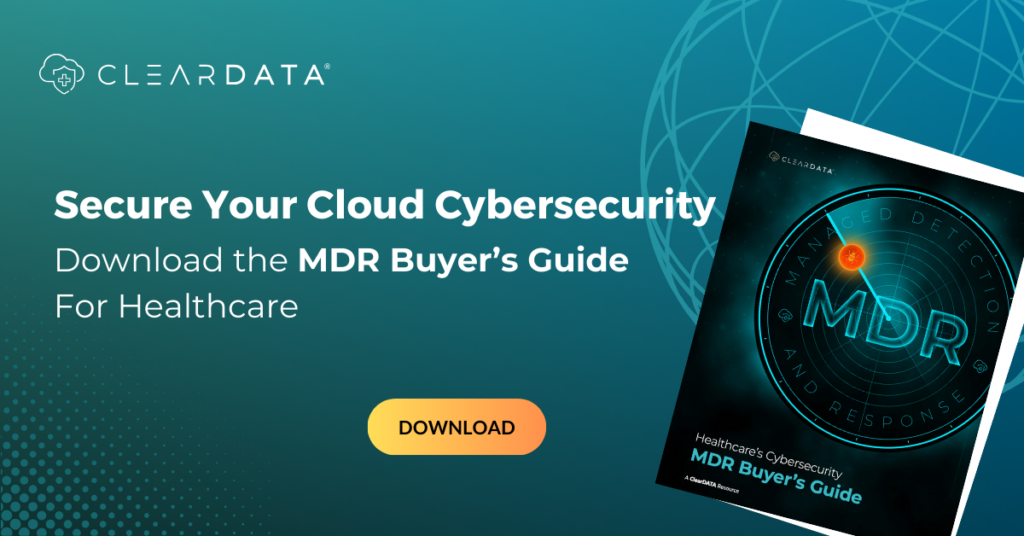“Are we prepared to trust a technology that, despite its hype, may compromise the very confidentiality it claims to protect?”
Chris Bowen, ClearDATA CISO & Founder was featured in Healthcare IT Answers.
Blockchain in Healthcare: A Necessary Innovation or a Misguided Panacea?
In recent years, blockchain technology has emerged as the buzzword across multiple industries, promising to revolutionize processes with its decentralized and secure framework. In the healthcare sector, it has been hailed as the solution to longstanding challenges such as data management, patient privacy, and supply chain transparency.
But as the initial excitement wanes, we must confront the question: Is blockchain truly the panacea it’s touted to be, or are we overlooking critical limitations that imply it is not the solution we think it to be?
It’s time to distinguish the blockchain hype from the hard truths.
What Is Blockchain?
Blockchain, is a decentralized ledger technology designed to provide a secure and verifiable record of transactions. Its architecture allows data to be stored across a network of computers, making it nearly tamper-proof and transparent. I will concede that these characteristics have naturally drawn interest from healthcare professionals, who see potential applications in areas like cybersecurity, patient data management, clinical trials, and drug supply chains.
Real-World Applications of Blockchain in Healthcare
Blockchain is not merely theoretical in healthcare — several real-world applications demonstrate its capabilities.
Supply Chain Transparency: The pharmaceutical industry has begun leveraging blockchain to enhance supply chain transparency. By tracking medications from manufacturer to patient, blockchain systems help ensure each transaction is secure and transparent, a crucial factor in combating counterfeit drugs.
Patient Data Management: Blockchain has been proposed as a tool to manage electronic health records (EHRs), offering patients control over their data while allowing authorized healthcare providers to access it securely. The technology can enhance interoperability, reduce the redundancy of medical records, and improve data accuracy across various healthcare systems.
Clinical Trials: Blockchain can enhance the transparency and integrity of clinical trial data, ensuring that results are not manipulated or altered. It can also streamline data sharing between research institutions, increasing collaboration, formation of peer-to peer networks allowing for the patient to gain more control over their health and well being.
Interoperability: Different healthcare systems rarely operate on the same platforms or speak the same language, leading to data silos. Blockchain’s decentralized nature could potentially facilitate enhanced data sharing across different platforms, creating a more cohesive patient care.
While these applications highlight blockchain’s potential, they also raise serious concerns. As we explore these so-called promising uses, we must question whether they genuinely prioritize the security and privacy of patients.
Are we prepared to trust a technology that, despite its hype, may compromise the very confidentiality it claims to protect?
The Challenges of Blockchain in Healthcare
One of the most pressing concerns is patient privacy. As blockchain ensures data immutability and transparency, it conflicts with privacy regulations like HIPAA and GDPR. How can healthcare entities ensure that personal health information (PHI) is adequately anonymized on a blockchain? The technology was not designed for the “right to be forgotten” principle inherent in GDPR. Once a transaction is recorded, it becomes permanent. If a patient requests their data be deleted, how can this be accommodated without compromising the system’s integrity?
Scalability presents another significant hurdle. Healthcare systems are inherently complex and data heavy. Blockchain’s decentralized nature requires substantial computational power to verify and add each block. Can the technology scale efficiently to handle the vast amounts of data generated daily by healthcare institutions, from electronic health records (EHRs) to imaging files?
Moreover, regulatory compliance in healthcare is stringent. For blockchain to be viable, it must meet the rigorous requirements of laws such as HIPAA.
This raises further questions about governance: who controls access to the blockchain, and how is compliance ensured and audited?
Raising Tough and Necessary Questions
Let us take a moment to consider these questions about blockchain technology, which I also encourage my peers and colleagues to apply to any new technology set to be implemented in our healthcare system.
- Are we prioritizing technology over patient needs? Blockchain enthusiasts often tout its transparency as a key benefit, but we must scrutinize whether this transparency comes at the cost of patient privacy.
- Can we strike a balance that meets the stringent demands of healthcare regulations while harnessing blockchain’s potential?
- Can blockchain be implemented in a healthcare setting without sacrificing speed and efficiency, especially when dealing with vast amounts of sensitive data?
If we cannot confidently answer any of these questions, then isn’t blockchain a solution waiting for a problem?
We cannot ignore the trade-off between technology’s efficiency and security. Healthcare and tech leaders must confront these challenges of blockchain. The real question isn’t whether blockchain belongs in healthcare, but how we can adapt this technology to address the unique needs of healthcare while overcoming its inherent limitations.
Does Blockchain Put Patients First?
I will bring readers back to my original question — is blockchain a game changer in healthcare, or is it all hype? We will continue to explore blockchain’s role in healthcare, that much is clear. While doing so, healthcare and technology leaders must prioritize patient needs and privacy above all else. We must challenge ourselves to think differently, to innovate responsibly, and to ensure that technology serves as a tool to enhance and protect patient privacy, not hinder it.
The potential for blockchain in healthcare is undeniable, but so are the challenges.
So, let’s commit to asking tough questions and finding solutions that truly benefit patients.
Original Article Published in Healthcare IT Answers.



